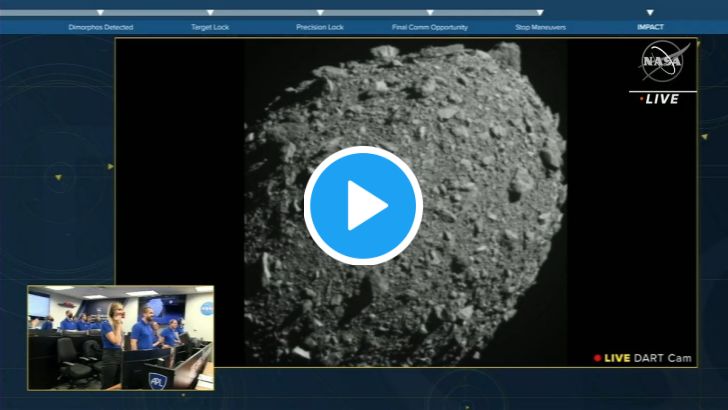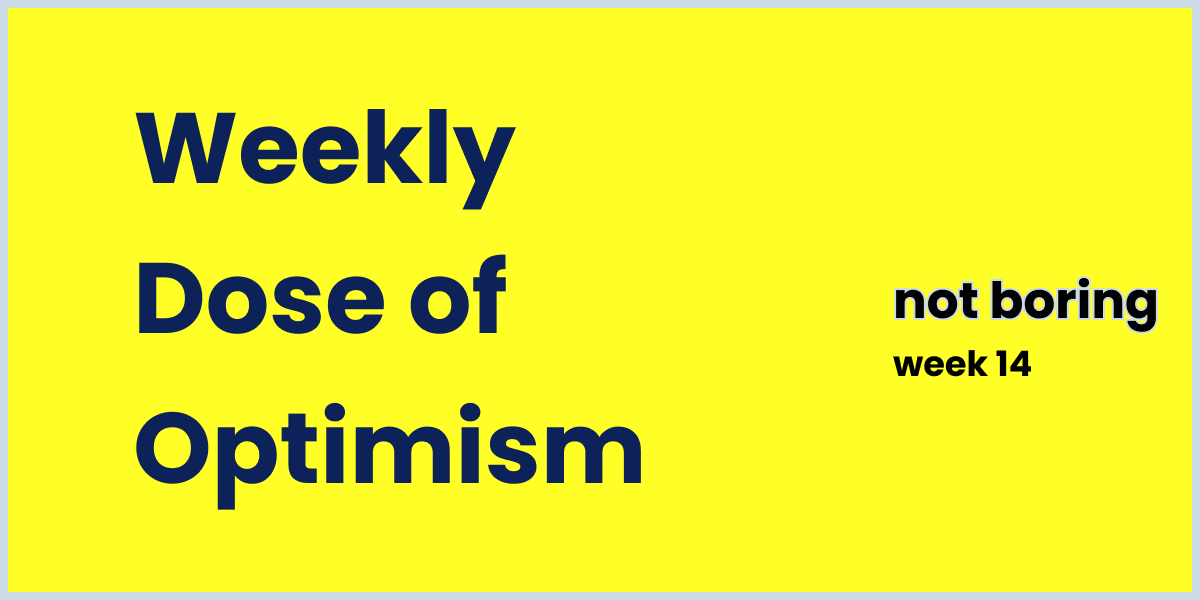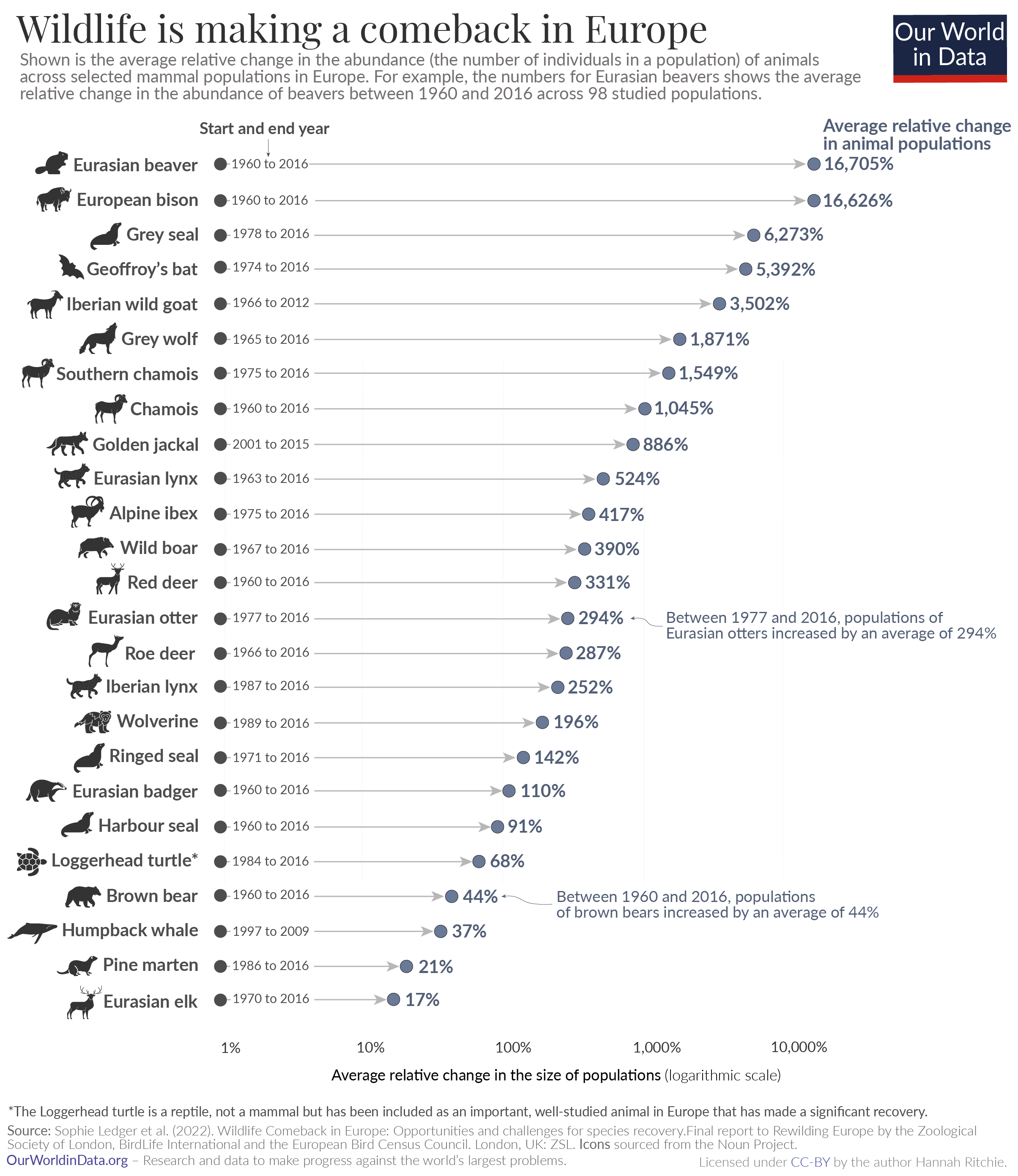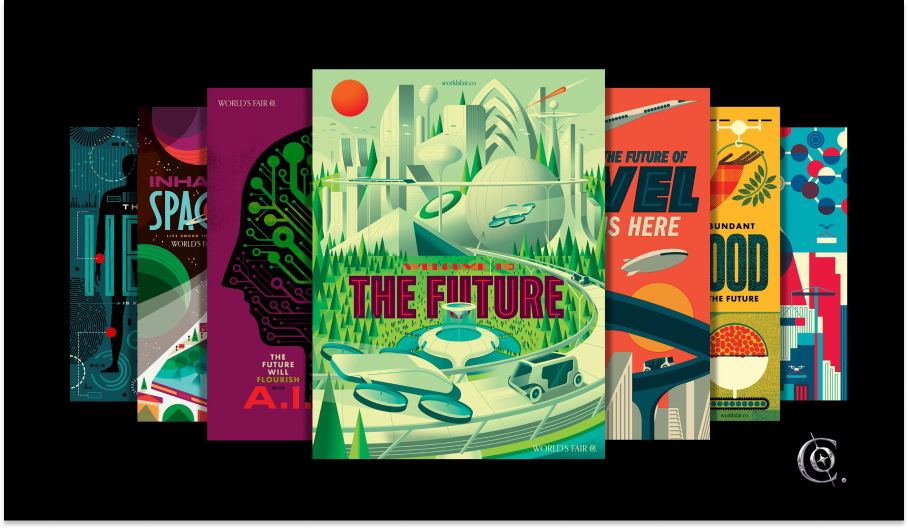Not Boring by Packy McCormick - Weekly Dose of Optimism #14
Weekly Dose of Optimism #14Progress and Optimism, Marathon World Records, Mammal Comebacks, DART, a Nuclear Enchanted Notebook, and The World's Fair Co.
Come for the Optimism, stay for the in-depth analyses of tech companies and trends: Hi friends 👋, Happy Friday and welcome to our 14th Weekly Dose of Optimism. If you’re interested in how Not Boring has grown over the past few years, we did a Twitter thread (sorry!) on the topic. Long story short:
If you’re interested in more of the specifics and numbers, check out the thread (again, sorry, we hate ourselves too sometimes) below:  Now, let’s get to it. (1) 🎧 We Know Shockingly Little About What Makes Humanity Prosper 🎧 From The Ezra Klein Show
We all know Patrick Collison, the charmingly Irish and intellectual co-founder and CEO of Stripe, the fourth most valuable privately held “startup” in the world. He’s lesser known for, but perhaps more influential in, the co-creation and support of Progress Studies. The discipline, which was essentially written into existence by Collison and economist Tyler Cowen in this Atlantic piece titled, “We Need a New Science of Progress,” studies the history, nature, and characteristics of human progress. The key insight of Progress Studies is that progress is more fragile and uncertain than it appears —and, given progress’ general importance in…everything…, we should probably study it more closely. Collison’s influence in this sphere — thanks to his ~$10B net worth, prestige within engineering circles, actual intellectual contributions, and novel funding approach — probably outranks just about anyone else in the world. This whole podcast is worth a listen (or transcript worth reading) because it’s likely Collison’s most robust articulation of his worldview. If I had to sum up that worldview in a sentence: optimistic that we can continue to accelerate the rate of progress, if we understand its causes and intentionally create environments in which it can thrive. BONUS: AN END TO DOOMERISM Hannah Ritchie for Big Think Speaking of Progress Studies and Optimism, Hannah Ritchie—the head of Research at Our World in Data—just came out as an optimist. Not a blind optimist, though. Hannah is too data-driven for that. She subscribes to a more Not Boringian definition of optimism: “hopefulness and confidence about the future or the success of something.” Ritchie’s own optimistic worldview, I think, aligns quite closely with Collison’s, and I know, pretty much 100% aligns with my own which I laid out in Optimism. (2) Eliud Kipchoge Lowers His Own Marathon World Record by Half a Minute Rachel Bachman for The Wall Street Journal Speaking of progress, history’s fastest marathon runner just smashed his own world record, clocking an official 2 hours, 1 minute, 9 seconds — shaving 30 seconds off his 2018 time. Eliud Kipchoge (great profile in The Irish Examiner) is most widely known for being the first runner to run 26.2 miles in under 2 hours, though that’s not an official world record because the event was not an open competition, but rather, was designed specifically for the breakthrough. Like the 4 minute mile, the 2 hour marathon is an almost mythical threshold that seems both physically and mentally unbreakable. But the 4 minute mile falling was one of the all-time great proof points for the idea that when one person shows something is possible, all of the sudden, a lot of other people see that it’s possible. Kipchoge, or some other future marathon runner, breaking the 2 hour marathon would be a similar feat. Our guess is that when someone eventually breaks the barrier, a bunch of people are going to start running sub-2 in short order. A good reminder that impossible things often aren’t. (3) Wild mammals are making a comeback in Europe thanks to conservation efforts Hannah Ritchie for Our World in Data
Not only are we making progress, we (and by “we” I mean humans and animals) are making comebacks! The same Hannah Ritchie from the bonus article above, shows how large mammals are once again flourishing in Europe thanks to conservation efforts. Take the European bison, for example: nearly driven to extinction in the early 20th century due to hunting and habitat loss, there are now nearly 10,000 in the wild. Turns out, the easiest way to prevent animal extinction is to…stop intentionally killing them. But beyond a decline in hunting, conservation, reintroduction, and wildlife protections programs have allowed these once endangered species to flourish again. (4) NASA crashes DART spacecraft into asteroid in world's 1st planetary defense test Tariq Malik for Space.com   If we humans are progressing and animals are making a comeback, it’d be a damn shame if some asteroid plummeted out of space into earth causing serious environmental damage, mass extinction, and generally devastating civilization beyond repair — wouldn’t it? Fear not — we have a plan: smashing miniature spacecraft into oncoming asteroids. NASA’s DART Mission’s (Google it, the search results page is fun!) objective is to test methods of planetary defense against near-Earth objects, like asteroids and other various space objects. Essentially, how can we deflect oncoming objects off their trajectory such that they miss crashing into earth. This first mission seems to have been a success, but to be fair, the stakes were relatively low: even if the mission failed, the asteroid was never destined for earth. As an aside, nothing gets me pumped up like a bunch of NASA nerds cheering, high-fiving, and fisting-pumping over some grainy, hard-to-understand-what’s-actually-going-on video — it means we still have people out there that are truly jazzed up about space. We need more of those folks. (5) The Future History of the Nuclear Renaissance With Isabelle Boemeke By Isabelle Boemke for Palladium In “The Enchanted Notebook” we wrote that one way to create the future is to imagine it, write it down, and reverse engineer how we got there. Isabelle Boemke does just that in this piece: imagine a world 30 years in the future in which a nuclear renaissance has made energy cheap and abundant, detail exactly what that world looks like, and reverse engineer what must’ve happened to get there. Here’s how Boemke breaks it down:
Who knows exactly how the future will play out, but this seems like a relatively believable path — and one worth trying to re-create in the real world. We’re already seeing some of these catalysts play out and nuclear momentum is starting to leak out of the activist circles into lives of everyday folks that just want cleaner, cheaper, and more abundant energy. Bonus: The World’s Fair Co. Posters Speaking of painting a picture of the future you want to see, The World’s Fair Co., released posters in collaboration with Invisible Creature (the folks behind the NASA Visions posters) that depict the future of different sectors of the economy: space, AI, crypto, food, oceans, clean energy, health, robotics, cities, travel, and science. The World’s Fair Co. is one of our favorite projects here at Not Boring. As the name suggests, founder Cam Wiese & co are bringing back The World’s Fair in order to bring an optimistic vision of the future to life. At the Fair, “you’ll see and interact with the technologies of today that are shaping the world of tomorrow.” It’s a crazily ambitious project — the kind I’m thrilled to see people pursuing — and I can’t wait to attend towards the end of the decade when they pull it off. You can check out the full gallery (and buy prints of the posters, I picked up “Welcome to the Future”) here, and check out the whole shiny new site here. I’ll leave you with this quote from The World’s Fair Co.’s Mission Statement:
Humans are pulling off some pretty incredible things every week. Whenever you find examples, share them here and we’ll feature some in the newsletter. That’s all for this week — I’ll be back in your inbox right before 9am EST on Monday morning. Enjoy the weekend. Thanks for reading, Packy If you liked this post from Not Boring by Packy McCormick, why not share it? |
Older messages
Tegus: The Outsiders
Thursday, September 29, 2022
Meet the under-the-radar $3 billion company modernizing investment research
The Enchanted Notebook
Monday, September 26, 2022
Or, How to write the future into existence
Weekly Dose of Optimism #13
Friday, September 23, 2022
Adnan, Incarcerated Coders, NEPA Changes, The Lithium Beat, Breakthrough Prizes, Extinct Influenza
Indistinguishable from Magic
Monday, September 19, 2022
Magical Technology: iPod, Spotify, Figma, AI Art, Arc, web3, and beyond
Weekly Dose of Optimism #12
Friday, September 16, 2022
Goalkeepers, Child Poverty, The Merge, Repurposed Power Plants, Giving It All Away
You Might Also Like
+34% more leads (study)
Friday, February 28, 2025
I love that you're part of my network. Let's make 2025 epic!! I appreciate you :) Today's hack +34% more leads (study) Diego Chacon decided to test what specific format of the same offer (
🔍 Why Brands Need To Launch A Social Show
Friday, February 28, 2025
February 27, 2025 | Read Online All Case Studies 🔍 Learn About Sponsorships Social is becoming the new TV. From our consumption habits to the content types - every day we progress to a landscape where
High-traffic sites less than a year old
Friday, February 28, 2025
These numbers are wild
Help me help you!
Thursday, February 27, 2025
Your opinion means everything hey-Jul-17-2024-03-58-50-7396-PM Can you believe Masters in Marketing is already 8 months old? Aw, so cute! And, like any anxious new parents, we want to know how we'
Discover a preview of the content keeping Digiday+ members ahead
Thursday, February 27, 2025
Digiday+ members have more ways than ever to stay ahead of the news and trends transforming media and marketing. Explore premium content from our editors below, including weekly briefings, research and
See you in Boston?
Thursday, February 27, 2025
...back in person for the first time since 2019! Exploding Topics Logo Presented by: Semrush Logo You follow Exploding Topics because you want to get an edge on your competition. Now take that
Why I'm doubling down on my community in 2025... (free bonus)
Thursday, February 27, 2025
Hi there 2025 is chugging along (it's almost March!) – and there's a ton going on right now. But there's something that hasn't changed. Your agency still needs a constant stream of new
Programmer Weekly - Issue 243
Thursday, February 27, 2025
February 27, 2025 | Read Online Programmer Weekly (Issue 243 February 27 2025) Welcome to issue 243 of Programmer Weekly. Let's get straight to the links this week. Streamline IT management with
🎙️ New Episode of The Dime China Tariffs & The Next Era of Vapes: Impact on Supply Chains & Brands ft. Nick Kovacevich
Thursday, February 27, 2025
Want to be featured on The Dime Podcast? Scroll to the end of this email to find out how. Listen here 🎙️ China Tariffs & The Next Era of Vapes: Impact on Supply Chains & Brands ft. Nick
80% less time on social reporting sound good?
Thursday, February 27, 2025
Get Forrester's Total Economic Impact™ of Sprout. ͏ ͏ ͏ ͏ ͏ ͏ ͏ ͏ ͏ ͏ ͏ ͏ ͏ ͏ ͏ ͏ ͏ ͏ ͏ ͏ ͏ ͏ ͏ ͏ ͏ ͏ ͏ ͏ ͏ ͏ ͏ ͏ ͏ ͏ ͏ ͏ ͏ ͏ ͏ ͏ ͏ ͏ ͏ ͏ ͏ ͏ ͏ ͏ ͏ ͏ ͏ ͏ ͏ ͏ ͏ ͏ ͏ ͏ ͏ ͏ ͏ ͏ ͏ ͏ ͏ ͏ ͏ ͏ ͏ ͏ ͏ ͏ ͏ ͏





